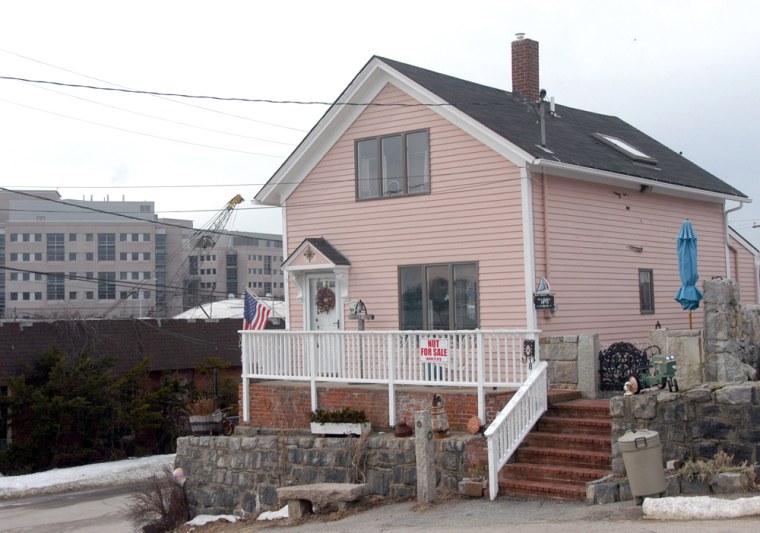The Supreme Court on Thursday ruled that local governments may seize people’s homes and businesses — even against their will — for private economic development.
It was a decision fraught with huge implications for a country with many areas, particularly the rapidly growing urban and suburban areas, facing countervailing pressures of development and property ownership rights.
As a result, cities now have wide power to bulldoze residences for projects such as shopping malls and hotel complexes in order to generate tax revenue.
The 5-4 ruling — assailed by dissenting Justice Sandra Day O’Connor as handing “disproportionate influence and power” to the well-heeled — represented a defeat for some Connecticut residents whose homes are slated for destruction to make room for an office complex.
Those residents argued that cities have no right to take their land except for projects with a clear public use, such as roads or schools, or to revitalize blighted areas.
Under the ruling, residents still will be entitled to “just compensation” for their homes as provided under the Fifth Amendment. But residents involved in the lawsuit expressed dismay and pledged to keep fighting.
“It’s a little shocking to believe you can lose your home in this country,” said resident Bill Von Winkle, who said he would refuse to leave his home, even if bulldozers showed up. “I won’t be going anywhere. Not my house. This is definitely not the last word.”
Jobs, tax revenue cited
Writing for the court’s majority in Thursday’s ruling, Justice John Paul Stevens said local officials, not federal judges, know best in deciding whether a development project will benefit the community. States are within their rights to pass additional laws restricting condemnations if residents are overly burdened, he said.
“The city has carefully formulated an economic development that it believes will provide appreciable benefits to the community, including — but by no means limited to — new jobs and increased tax revenue,” Stevens wrote.
He was joined by Justice Anthony Kennedy, David Souter, Ruth Bader Ginsburg and Stephen Breyer.
O’Connor, who has been a key swing vote on many cases before the court, issued a stinging dissent. She argued that cities should not have unlimited authority to uproot families, even if they are provided compensation, simply to accommodate wealthy developers.
“Any property may now be taken for the benefit of another private party, but the fallout from this decision will not be random,” O’Connor wrote. “The beneficiaries are likely to be those citizens with disproportionate influence and power in the political process, including large corporations and development firms.”
She was joined in her opinion by Chief Justice William Rehnquist, as well as Justices Antonin Scalia and Clarence Thomas.
Thomas filed a separate opinion to argue that seizing homes for private development, even with “just compensation,” is unconstitutional.
“The consequences of today’s decision are not difficult to predict, and promise to be harmful,” Thomas wrote. “So-called ’urban renewal’ programs provide some compensation for the properties they take, but no compensation is possible for the subjective value of these lands to the individuals displaced and the indignity inflicted.”
Homeowners refused to budge
The case involves Susette Kelo and several other homeowners in a working-class neighborhood in New London, Conn., who filed a lawsuit after city officials announced plans to raze their homes to clear the way for a riverfront hotel, health club and offices.
The residents had refused to budge, arguing it was an unjustified taking of their property.
“I’m not willing to give up what I have just because someone else can generate more taxes here,” said homeowner Matthew Dery, whose family has lived in the neighborhood known as Fort Trumbull for more than 100 years.
New London contends the condemnations are proper because the development plans serving a “public purpose” — such as boosting economic growth — are valid “public use” projects that outweigh the property rights of the homeowners.
The Connecticut Supreme Court agreed with New London, ruling 4-3 in March 2004 that the mere promise of additional tax revenue justified the condemnation.
Issue across the country
Nationwide, more than 10,000 properties were threatened or condemned between 1998 and 2002, according to the Institute for Justice, a Washington public interest law firm representing the New London homeowners.
In many cases, according to the group, cities are pushing the limits of their power to accommodate wealthy developers. Courts, meanwhile, are divided over the extent of city power, with seven states saying economic development can justify a taking and eight states allowing a taking only if it eliminates blight.
In New London, city officials envision replacing a stagnant enclave with commercial development that would attract tourists to the Thames riverfront, complementing an adjoining Pfizer Corp. research center and a proposed Coast Guard museum.
“The record is clear that New London was a city desperate for economic rejuvenation,” the city’s legal filing states, in asking the high court to defer to local governments in deciding what constitutes “public use.”
The New London neighborhood that will be swept away includes Victorian-era houses and small businesses that in some instances have been owned by several generations of families. Among the New London residents in the case is a couple in their 80s who have lived in the same home for more than 50 years.
Where other states stand
According to the residents’ filing, the seven states that allow condemnations for private business development alone are Connecticut, Kansas, Maryland, Michigan, Minnesota, New York and North Dakota.
Eight states forbid the use of eminent domain when the economic purpose is not to eliminate blight; they are Arkansas, Florida, Illinois, Kentucky, Maine, Montana, South Carolina and Washington.
Another three — Delaware, New Hampshire and Massachusetts — have indicated they probably will find condemnations for economic development alone unconstitutional, while the remaining states have not addressed or spoken clearly to the question.
